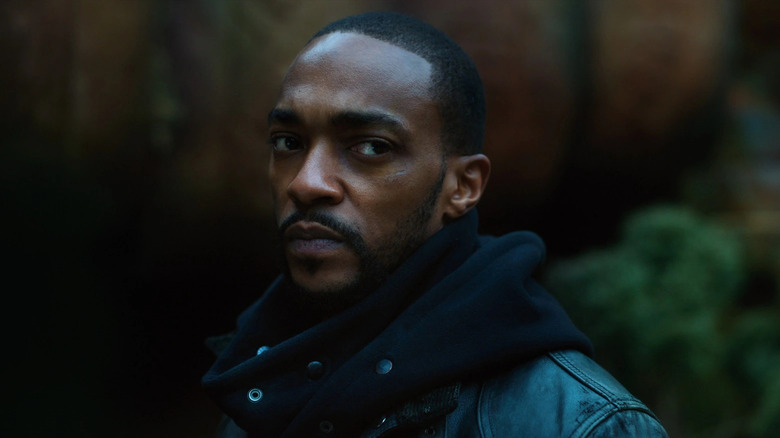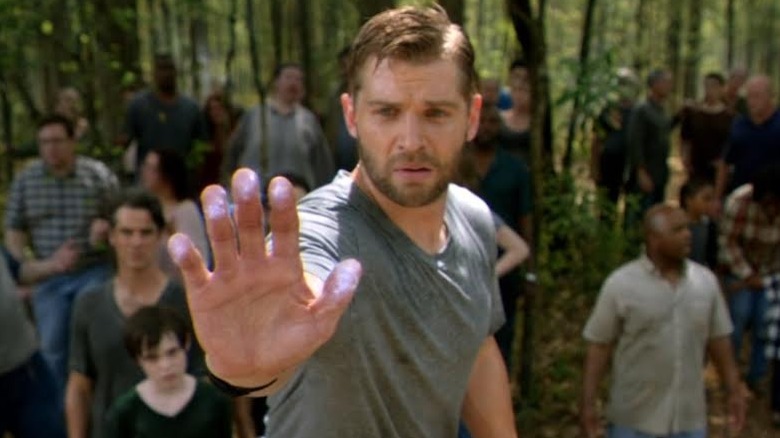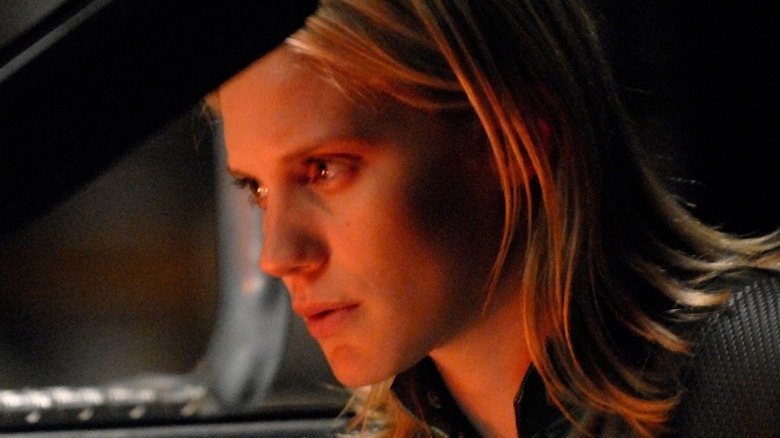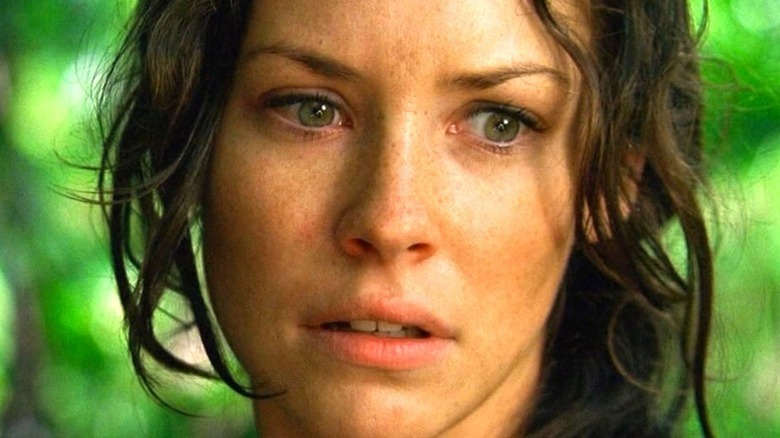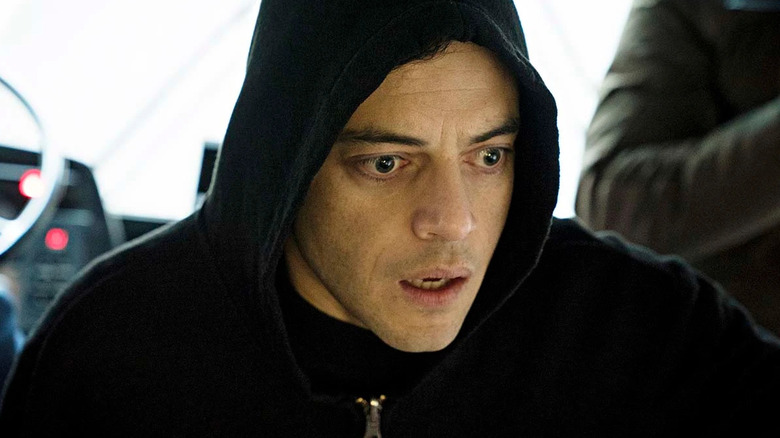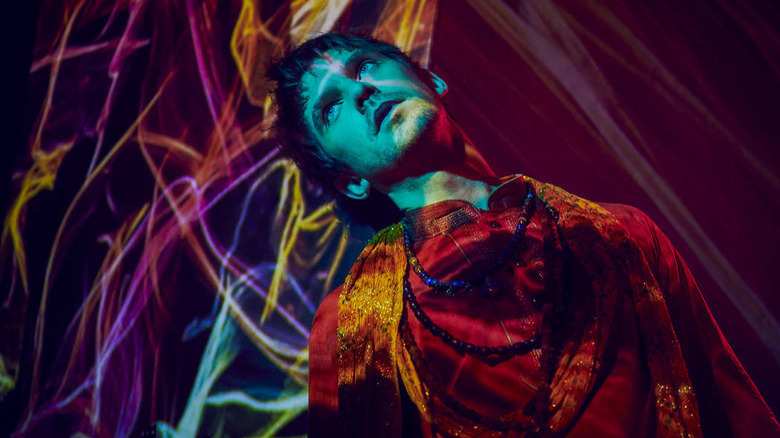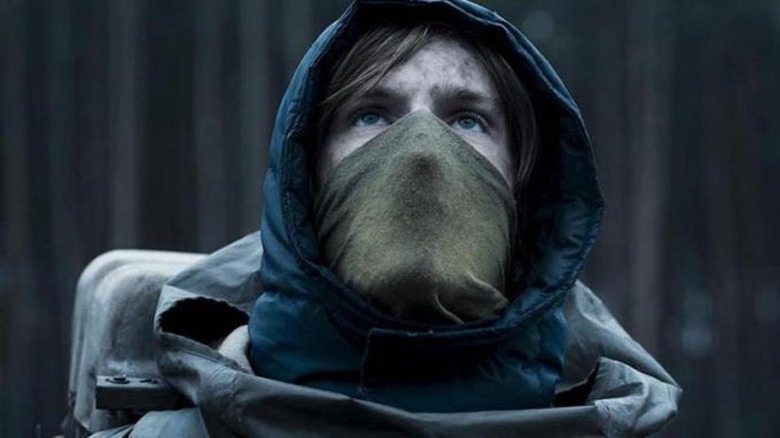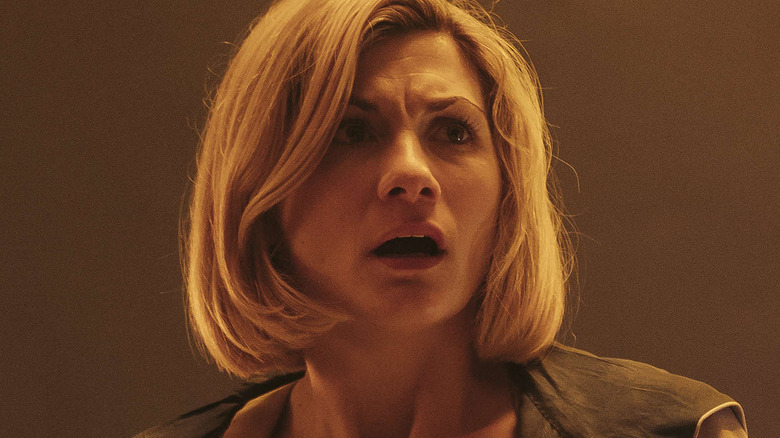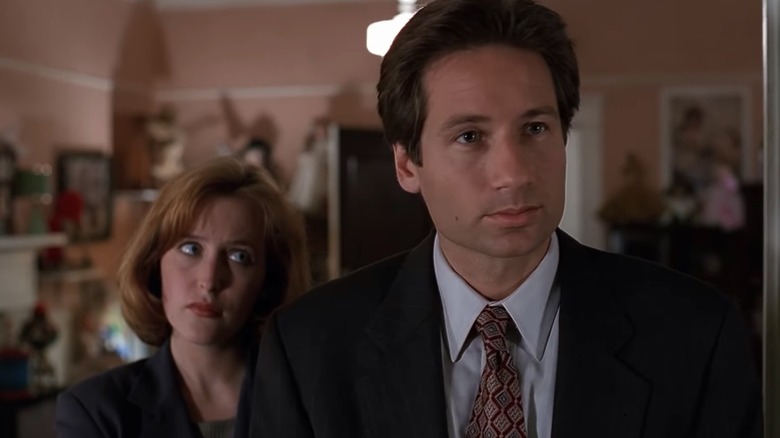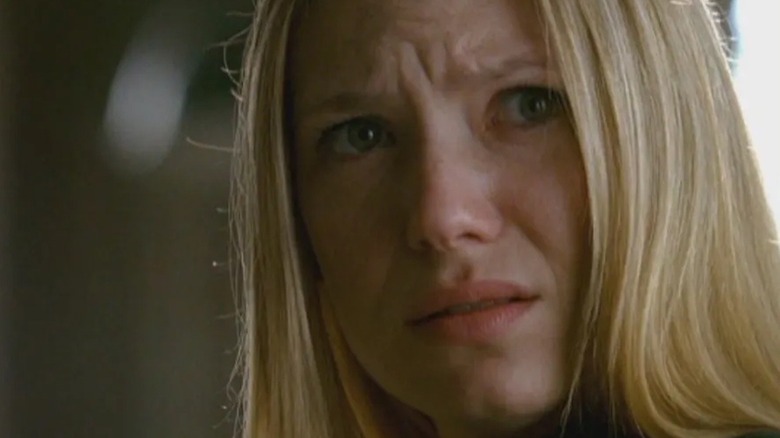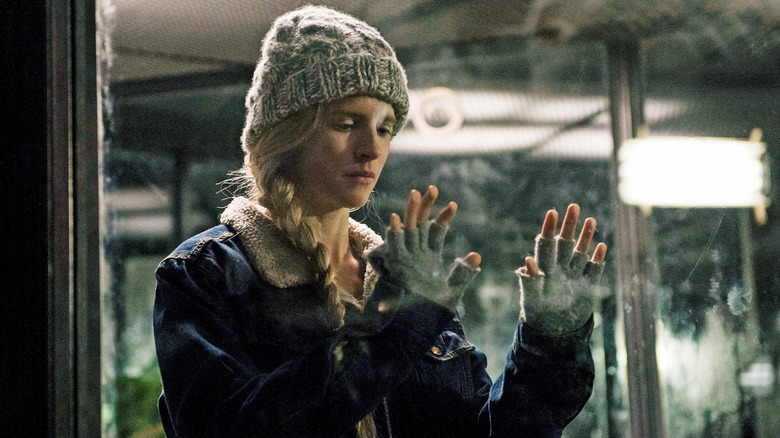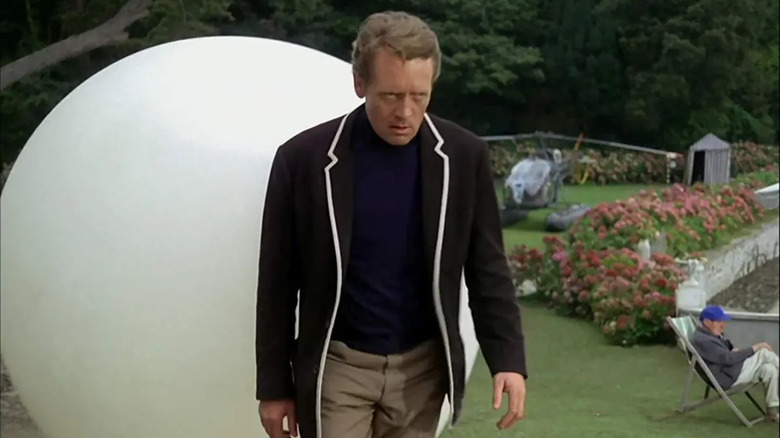Sci-Fi Shows People Still Don't Understand
Whether it's a cyberpunk mystery, an outer space adventure, or a gritty drama that travels through time and alternate dimensions, the science fiction genre can produce stories that confuse audiences. Especially in television, where serialized drama can span multiple years of stories, a poorly planned show can result in plenty of plot holes, and franchises with expansive lore can be littered with inconsistencies.
But there are some sci-fi programs that are even more bewildering, with ambitious stories so convoluted that they don't just confuse viewers during their initial run — they still cause audiences to struggle to understand their intricate plots and mind-numbing complexities years after ending. Meanwhile, some shows even contain explorations of philosophical issues, metaphors, and symbolism that inspire wildly divergent interpretations.
Though sagas like "Star Trek" and "Stargate" have left some unresolved questions behind, these head-scratching sci-fi series are balls of confusion that we still can't make sense of today. So charge up your quantum accelerator and set rocket boosters to full power, because we're going on a trip back through time to find sci-fi shows fans still don't understand.
Altered Carbon
Netflix's "Altered Carbon" ran two seasons with two different lead stars (Anthony Mackie and Joel Kinnaman) playing the same character, and that's the least befuddling part about it. A cyberpunk thriller, "Altered Carbon" is set in a future where people can receive new bodies and swap minds.
Much of the confusion for this show comes simply from its deep fictional universe where unusual political and social structures play key roles — new ideas are often given awkward slang terms that can be tough to pick up. Factions like the Envoy and the Praetorians have motives and agendas that aren't always easily defined. Characters receiving new "sleeves" (bodies) thanks to a stack (disc) that contains their memories and consciousness is just the tip of the iceberg. Some people can even split their stacks between different sleeves, making it more than a little confusing who is who.
But moving past some already bewildering terminology and intricate world building, the series is also a murder mystery that's just as compelling and downright confusing as anything you'll find this side of "True Detective." Like many on this list, "Altered Carbon" is a strange journey through a bizarre sci-fi world that requires some focus and thought to follow and has plenty of audiences perplexed.
Under the Dome
Arguably one of the most disappointing sci-fi series of the past 20 years, "Under the Dome" was based on an acclaimed Stephen King novel and its first season showed incredible promise. Telling the story of a small town that suddenly finds itself encased in an invisible dome and cut off from the outside world, the initial batch of stories amounts to a successful mystery and suspenseful thriller. But trying to turn a one-off novel into a multi-season show proved problematic, as the creators introduced many wildly different elements that seem to come out of nowhere in an effort to extend the story.
This includes a war among the town, an alliance with aliens, and even an episode that introduces an alternate reality. Suddenly what had initially hooked audiences as a compelling but relatively straightforward mystery and character drama quickly devolves into baffling sci-fi schlock. To make matters worse, audiences were left dumbfounded as new storylines come and go with no explanation. As a result, ratings fell, and by the time the show was canceled, there were too many unanswered questions to wrap up the show in any kind of satisfying way.
But despite all the unresolved plotlines, the ending of the show still tries to shove in a few more in the last episode. A decade later, "Under the Dome" is sadly remembered as a frustrating sci-fi adventure that makes little sense.
Battlestar Galactica
In 1978, "Battlestar Galactica" mixed the fast-paced sci-fi adventure of "Star Wars" with the wild theories of so-called "ancient astronauts." It only lasted a year but garnered a cult following that led to a long-awaited revival in 2003. The new series greatly expands on the mythology of the show, but for some, the added complexity just makes it a puzzle that remains difficult to piece together.
In the series, a race of sentient robots decimates a thriving civilization whose survivors flee to the fabled lost world called Earth. But the twist is that some of the characters are secretly robots in disguise, which was enough to bewilder plenty of viewers as the show tried to write around its own retcons. The importance of a Bob Dylan song also made little sense, even when they tried to explain it as some kind of prophecy. But when you learn that series creator Ron Moore admitted the Cylons, contrary to what the show repeatedly tells viewers, have "no plan," it starts to make sense why everything's so confusing.
But the most downright frustrating aspect of the series might be its shoe-horned religious ideas of destiny and faith, which often feel like an exercise in hollow symbolism meant to provide thematic weight. In the final episode, a major character is implied to have been a heavenly angel all along, and an attempt to hastily resolve a series-long riddle suggests everything was really just God's doing. For a show whose initial appeal was its grounded, gritty realism, it went on to confuse plenty of hardcore sci-fi fans.
Lost
The epitome of serialized stories that were (sort of) made up as they went along, "Lost" starts off as a plane crash survivor character drama. But before the end of the pilot episode, the series becomes a captivating supernatural mystery as new sinister forces are revealed on the Island. By the end of its run, the story includes time travel, alternate realities, and even some religious symbolism.
For the most part, though, the addition of fantastical elements actually works — it's just that there's so much going on that it becomes overly complicated and, as a result, fans have been left puzzled for years. While some audiences were more than confused by much of the show's story, those with a keen eye were able to follow along. But with so much to keep track of, it often feels like much of the larger philosophical issues at play are left to languish. The show's focus on fate and free will kind of fizzles out, and some plot points and characters that are implied to have deeper meaning and importance to the story — Walt Lloyd, for instance – are pretty much dropped.
A lot of this can be chalked up to the writers acknowledging that they had no idea where they were going with the story — or they kind of had an idea but had to change it on a routine basis to keep network executives happy, not that it's any consolation to confused viewers.
Mr. Robot
The sci-fi conspiracy thriller "Mr. Robot" stars Rami Malek as cyber security engineer and hacker Elliot Alderson, who is enlisted by an enigmatic figure called Mr. Robot to aid in his hacktivist causes. Set in a world of intricate and complex conspiracies involving monolithic corporations, faceless governments, and shadowy agents, the web of lies and back-alley deals gets tricky to follow. But to add an extra level of confusion, Alderson suffers from serious anxiety, depression, and multiple personalities, and he can often be a classic unreliable narrator.
To emphasize Alderson's troubled mental state, the show is often intentionally confusing. Even fans of the show have commented that serious attention is required to fully grasp the story and connect every dot, even admitting that multiple viewings might be needed (via Reddit). Major revelations as early as Season 1 proved mind boggling to many viewers, while others insisted that it will all be understood at the end of the series. But no matter how many times some fans watch it through, there's just so much densely plotted action on top of confusing themes of identity, redemption, and loss that it sometimes feels like "Mr. Robot" is more trouble than it's worth.
Nevertheless, even its few critics have acknowledged the quality of the writing, acting, and directing. So if you're willing to put in the work to understand the show, you'll be rewarded.
Legion
Comic book adaptions made for TV aren't typically known for being overly intricate or hard to understand, but there's one exception that proves the rule — the 2017 FX series "Legion." The series is inspired by characters from Marvel's "X-Men" comics, and its creator Noah Hawley knows a thing or two about complicated plots, having worked on the time-jumping crime drama "Fargo." But "Legion" is more than just complex — it's also deeply philosophical, psychedelic, and a decadent feast for the eyes.
"Legion" focuses on David Haller, a man suffering from schizophrenia who also possesses incredible psychic powers. Like in "Mr. Robot," Hawley uses convoluted storytelling to make the audience feel just as confused as the character, who is plagued by mental illness. Dream-like sequences and bizarre, abstract imagery provide a glimpse into what it's like to view the world through Haller's eyes.
Likewise, the story doesn't play out at all like a simple superhero adventure by employing a nonlinear narrative that can be difficult to grasp, with events often unfolding out of sequence. As the story jumps around in time and Haller's hallucinations play out on-screen, things can get downright surreal in what feels like a purposeful attempt to disorient the audience. With Haller possessing the power to reshape other people's reality, it's hard to tell what's real and what's not, which makes "Legion" one of the toughest superhero shows to decipher.
Dark
Running three seasons, the Netflix series "Dark" revolves around a child kidnapping that reveals an elaborate scheme by sinister forces that stretches back decades. Between its convoluted time-travel plot and examination of the human condition, "Dark" was called "mentally exhausting" by Paul Tassi of Forbes Magazine, and for good reason, as we're still struggling to figure everything out years later.
Even when binged, as many did in 2020 when the series was coming to a close and millions were trapped inside, "Dark" proved elusive to understand. As Tassi wrote, the series explores time travel in a way that few others have, and the story forces you down a maze of family ancestry and it can be very challenging to keep track of how everyone is related across various time periods. We meet characters when they're young and old; we meet their forebears; their descendants, and sometimes the way they are related isn't always so obvious. But that's hardly the only challenge, as we also discover much of the series is set in divergent timelines, adding a whole other layer of complexity.
And the series never lets up, either. It continues introducing new and confusing elements right up until the end, giving you no time to get acclimated to changes and fluctuations in time and dimension. A network of confusion, it's not a series that can easily be summed up, recapped, or given CliffsNotes for — you have to see it for yourself ... but be ready to work hard to understand it all.
Doctor Who
Unlike every other show on this list, "Doctor Who" is still on the air. But with just about 60 years and more than 800 episodes (nearly a hundred of which have been lost to time) — not to mention countless expanded universe radio dramas that are often referenced in the show itself, its continuity has become too elaborate and unwieldy for even the most diehard Whovian to unravel.
Put aside for the moment the show's central conceit of its main time-traveling hero reincarnating into a new actor's body every few years, which can be confusing enough for the uninitiated. But because the show has crafted decades of lore, it has written and rewritten its own internal logic and occasionally left audiences more than a little confused. The fact that The Doctor is a time traveler and some of their backstory is actually in the future, much of the show's own history has become so muddled that it can be hard to keep track of unless you've got a guidebook handy.
The Doctor's alternate incarnations like the Valeyard, the War Doctor, and their time-bending marriage to River Song are confusing enough, but the show continues to introduce more wild secret origin stories like the Fugitive Doctor and the Timeless Child. And then you learn there are alternate Doctors, genetic duplicates, parallel world versions, and an "Impossible Girl" storyline that may have retconned everything and it's enough to make your head spin. That doesn't even begin to touch on individual stories, some of which have even confused the cast of "Doctor Who."
The X-Files
Unlike "Doctor Who," where even single episodes can leave you struggling to make sense of their sci-fi shenanigans, few individual episodes of "The X-Files" are all that confusing. Settling for weird weekly procedurals more often than not, the show entails FBI agents Mulder and Scully investigating everything from genetic experiments to hideous mutations. But when it comes to the show's ongoing storyline about an alien invasion, audiences have often found themselves wondering what the heck is going on.
From the abduction of Mulder's sister during his childhood — an event that drives Mulder throughout the show's run — to the ill-received conclusion of Season 11, an overarching story wound its way through the series that seemed to be written on the fly. As such, some audiences couldn't quite make sense of it. Major plot twists flit back and forth between the extraterrestrial plot all being a hoax, a massive government cover-up, or some other kind of dark conspiracy, while some of the show's more philosophical themes only add to its complexity. Though forcing audiences to question everything is admittedly part of the show's premise, it doesn't seem like confusion was something the writers were going for.
Instead, it often seems like the show was attempting to fix its problems with overly ambitious storytelling, only to make things worse. In the end, more than a few longtime fans still find it puzzling, but they're willing to overlook the show's many inconsistencies.
Fringe
Like "The X-Files" on steroids, "Fringe" centers around an FBI agent thrown into the world of the bizarre. But the series also deals with more than just aliens and the paranormal. In fact, by the end of the show's first season, it has introduced an entire parallel Earth in an alternate timeline that is seemingly at war with our own, which immediately starts the series down the road to confusion.
With multiple versions of the same characters, each with hidden agendas, things only get more complicated. Some viewers had trouble figuring out how things are connected, who is doing what, and why. Then there's the war between strange visitors from an alternate future, whose own motives seem to shift from season to season. The problem with this one, however, might be the opposite of "Lost," as "Fringe" seems to have been planned a little too well at times. The show does a good job dropping hints about future storylines, as mentioned by fans on Reddit, but they are often buried too deep.
The series may have bitten off a little more than it could chew in Season 4 where both realities merge in a story that threw off some audiences, and still makes for some confusing viewing today. Meanwhile, stories that push the envelope with intentional misdirects only serve to further muddy the waters. With a vast and intricate mythology that can be hard to understand, there are still plenty of questions left unanswered.
The OA
We've seen shows that are confusing because of intricate webs of plot; dense, long-running continuity, and stories that were written on the fly and are filled with plot holes. But "The OA" is something else entirely — a series that is baffling but might have been comprehendible were it not unceremoniously canceled before it could resolve many of its biggest questions. A series that ends on one of the most jaw-dropping twists in TV memory, it begs for a follow-up season that never came.
"The OA" stars Brit Marling as a young blind woman who has been missing for seven years but pops up with a new name and her sight returned. She tells only a small group of allies where she has been during those missing years and reveals that more missing persons can be saved through a strange dimensional portal that serves as a gateway between multiple realms. But if that sounds strange, wait until you get to the more magical and mystical parts of the show, including characters who suddenly manifest supernatural powers. This includes one young woman who can communicate across realities, a psychic nightclub octopus, a shadowy mystic with a mysterious past, robots, and a "Quantum Leap"-style body transfer that allows characters to inhabit their own selves in other realities.
Think you're confused after that brief description? Wait until you watch it. Just don't expect to get any answers, as we're still trying to figure it out, knowing we may never get a resolution.
The Prisoner
Decades before every other entry on this list, the British sci-fi mystery thriller "The Prisoner" was practically famous for its mystifying story and mind-bending visuals. Due to the technological limitations of the era, it's remembered more for sheer weirdness rather than special effects, making "The Prisoner" a spiritual precursor to the likes of "Twin Peaks." The series starred Patrick McGoohan as a secret agent who resigns from his post, only to be abducted and held captive on a strange island where nothing is as it seems. Beyond its odd nature, "The Prisoner" became a groundbreaking landmark series that influenced multiple genres.
But despite its legacy as arguably one of the greatest single-season TV shows of all time, it's also one of the most confusing ever produced. McGoohan's intelligence agent is only ever called "Number Six" while his captors attempt to break his will week after week for some nebulous purpose. Meanwhile, strange sights like giant balloons that can incapacitate people — as quaint as they might seem to audiences today — were unlike anything anyone had seen at the time. But beyond its unusual style, the story is less than literal, playing out largely in metaphor and allegory, with every prop and plot beat seemingly hiding some kind of deeper meaning and significance.
Repetitive dialogue will ring through your ears and drive you mad, as Six is constantly asked "Who is Number One?" with no answer or resolution ever given. A series meant to be experienced and pondered, the story had little in the way of a concrete conclusion, and fans have debated its meaning for nearly 60 years (via EW).

